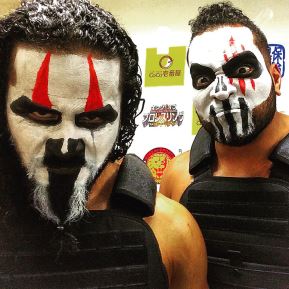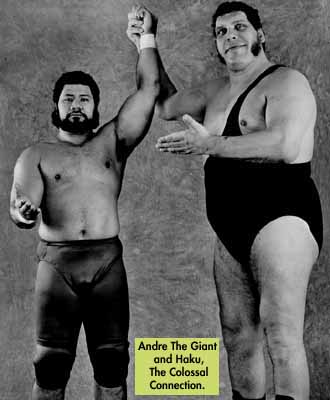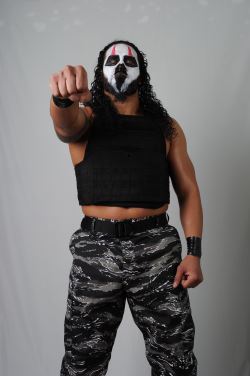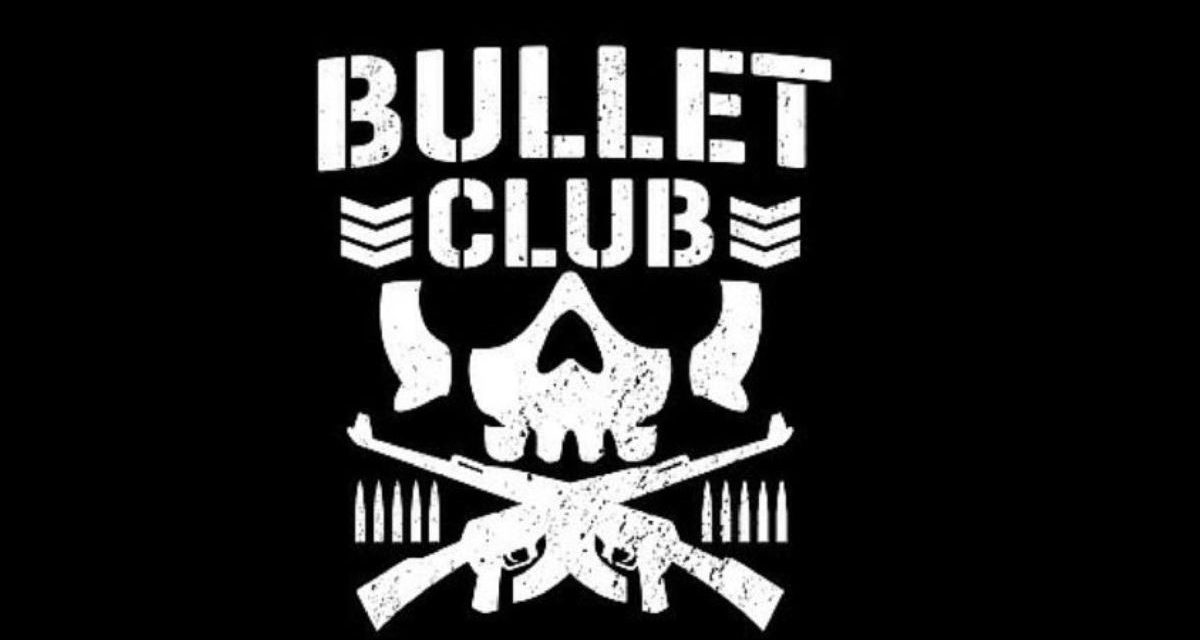The paths of the two sons of Haku/Meng split early in their wrestling careers. One son, Tevita, joined WWE as Camacho and then TNA as Micah; the other, Alipate, became Tama Tonga, a star in Japan, virtually unknown in North America.
Now, that’s all about to change, as the brothers are together as IWGP tag team champions — the Guerrillas of Destiny — and are making their first appearance for Ring of Honor in mid-May.
“I’m excited, making my debut for ROH and making my way around. I’ve never wrestled anywhere around here,” Tama Tonga told SLAM! Wrestling last week, the day before heading back to Japan for another tour.

The Guerrillas of Destiny are Tama Tonga (Alipate Fifita) and Tanga Loa (Tevita Fifita).
The brothers are the sons of Tonga Fifita, better known under his ring names of Haku, Meng and King Tonga.
“Me and my brother started at the same time, the only difference is that we both took different paths,” he said. “He went the North American side, straight to WWE. I took kind of a short indy run out there in Puerto Rico, then from Puerto Rico to Japan. We went different routes, and he got more exposure this side and I got more exposure the other side. Now, we are kind of switching.”
And back teaming, like they did when they initially began wrestling. Then they were the Sons of Tonga and now Guerrillas of Destiny.
It all goes back to family, which is a familiar refrain when talking with Tama, whose full name is Alipate “Pate” Fifita.
The Guerrillas of Destiny name was a group decision. “We were just shooting ideas, and it was just me and brother just throwing ideas,” he said. “Because his name, [Tevita Fifita] Tanga Loa means Family of God. My name, there’s different meanings in the Polynesian Islands, but the one I like best is God of War, so I’ll take that. I like our name to have the acronym of the God, G-O-D. Six years of not being together, going our different routes, learning the craft, and now being back together it Japan, where my father started his career, and us winning the belts, I just felt, well, before we won the belts, I just felt like it was destiny that we were brought back together. So the ‘guerrilla’, I was thinking that it was us fighting for a cause, we have our own personal cause, and we just looked at it as a militia, a freedom fighter or a fighter for a cause. We put everything together, and came up with G.O.D., Guerrillas of Destiny.”
The boys had to fight for their rights to wrestle too.
“I wanted to go into wrestling out of high school, but my father said no,” Tama Tonga said with a laugh. The parents were reluctant to see their children go into the nomadic business. They were told to do something else, but that wrestling could be a fallback if their career paths weren’t fulfilling.
“My brother, he had a full ride to UTEP, University of Texas El Paso, and I went six years in the Air Force,” said Tama Tonga. Tevita was a defensive end for football’s Miners, and graduated with B.A., majoring in Communications Electronic Media with a minor in criminal justice. Alipate elected to serve his country, and was stationed for all six years at Whiteman Air Force Base in rural Missouri, where he was an aircraft mechanic. He got to work on the Northrop Grumman B-2 Spirit bomber.

Haku, the father of Tonga Roa and Tama Tonga, with Andre the Giant.
“About three years in, we both knew [it would be wrestling],” said Tama. “I got a call about 10 at night from my brother, I was in Missouri at the time and he was in Texas. He was like, ‘We’re going into wrestling.’ I said, ‘Yes, yes! Now you go tell that to dad!’ That was our deal. We always wanted to, since we were kids.”
After a few years on the road with their dad as youngsters, the Fifita settled in a tiny community near Orlando, Florida, to attend school in the mid-’80s. They saw Haku/Meng when he was nearby, especially when WCW was taping its shows at Orlando’s Universal Studios. Now that they were grown men, with a second career in mind, they were fortunate that The Dudley Boys had set up a wrestling school about 20 minutes away from their parents’ place — the Team 3D Academy of Professional Wrestling and Sports Entertainment in Kissimmee.
“My dad and another one of our great friends, Ricky Santana, who was also an old-time wrestler, they started training me and my brother. We needed a ring and Bubba and Devon were the closest,” said Tama. “We went down on Sundays and my dad and Ricky were training me and my brother. It got to the point where we needed to go more than once a week, so we just signed up with Bubba and Devon’s school, and did theirs for about a year. I trained for about a year.”

Tonga Roa and Tama Tonga. Photo courtesy ROH/NJPW
The brothers were quick learners.
“Bubba and Devon’s school was great. They taught us the basics. Being in with my dad once a week, two times a week, we got old-school training, how he learned in Japan — and he beat the hell out of us. Now I appreciate it, but then I was like, ‘This ain’t wrestling!'” he chuckled. “It was good. I think we accelerated fast because of the type of training that we were getting, we were getting new school with Bubba and Devon, we were getting old school with Ricky Santana and my father.”
At a WWE-run training camp early in their career, Tevita was hired in 2009 and eventually became Camacho on WWE TV, teaming with Hunico.
Alipate ended up in Japan.

Tama Tonga. Photo courtesy ROH/NJPW
“It was a big learning curve. I was so green — I still am green. I was really wet behind the ears when I first started there,” he said of Japan. “They knew that, they could tell, that I had a lot of learn. Their style was different then too, and still is, but it was really different then too. So it was hard for me to really grasp what was going on. I just went in every day and gave it 100. I think that’s what has helped me keep my job there.”
Through the years, he graduated from a junior heavyweight to being a face-painted part of the Bullet Club, the stable of wrestlers that took over New Japan, and is now in the process of invading WWE.
While Doc Gallows and Karl Anderson are beating people up in WWE, apparently aligning themselves with former Bullet Club members A.J. Styles and Finn Balor, the Bullet Club continues on in New Japan. Besides the G.O.D., the Bullet Club currently includes the Young Bucks tag team, Yujiro Takahashi, Bad Luck Fale, Cody Hall, and the leader, Kenny Omega.
Things have been in a state of flux from the end of 2015, when Gallows, Anderson, and Styles announced they were leaving the Bullet Club and New Japan, as well as Shinsuke Nakamura, who is currently in NXT. “I don’t know where we stand right now, because we lost a lot of boys to WWE,” said Tama Tonga. “I think, to me, that’s still a good thing because they’re still advertising the Bullet Club, even if you see them over there, everybody knows they’re Bullet Club. So any kind of publicity is still good for us, I would think.”
New Japan’s North American exposure has increased in recent years too, in particular through its TV program on AXS TV and the availability of Internet-pay-per-views. G.O.D. won the IWGP tag team titles at NJPW’s Invasion Attack pay-per-view earlier this month, cleanly without any outside interference from Bullet Club over G.B.H. (Togi Makabe and Tomoaki Honma).
“With the TV and also the Internet, the Internet is really making the world a smaller place. Now it’s making Japan a really accessible thing right now in the States,” he said. “I think the exposure’s getting there and I think we’re only going to get more, and I think it’s going to pick up quick — especially with Shinsuke going over to WWE, everybody’s going to wonder, ‘Where’d he come from? Who’s this guy?’ Not a lot of mainstream know a lot about New Japan. Now with the Bullet Club, everybody’s going to be questioning where those guys came from. I think that’s going to lead them back to New Japan for more exposure.”
Tama considers himself lucky that he has been able to learn from the likes of Styles and Nakamura.
“I love watching [Styles]. I never really watched him before. Then when he came and wrestled in New Japan, I was in awe,” he said. “I was like, ‘That’s one of the greatest wrestlers I’ve ever seen.’ He is truly, truly phenomenal. His in-ring work is just amazing. I like that I’m very competitive, but I like to learn, especially from guys like Yujiro Takahashi, Shinsuke Nakamura and now A.J. Styles. Those are the best wrestlers in the world right in my face, right there in front of me, and I was absorbing.”
And both brothers continue to seek out advice from their father, widely considered one of the toughest men to ever become a professional wrestler.
“Today before I head out, I’m going to go over to his place and we’re going to watch me and my brother’s tag match from the last pay-per-view,” said Tama. “I’m going to go over, because that’s what we do, we watch it, and he’ll critique it, he’ll tell me what’s up, what he thinks, just give me ideas, go over it like a play, preparation.”
By this point, Tama is used to the long trips to Japan. “I enjoy flying. I get on the plane, and there’s so much for to do, watch movies, sleep, read a book. That’s my down time, that’s my think time — 13 hours on a plane just to sit there and do nothing, I love that,” he said.
The time difference is an issue, yes, but again, you become accustomed to it to a degree. “When I go there, I have no choice, because usually within a day or a day after, or the next day after that, we start wrestling right away, so you have to force your body to adapt quick,” he explained. “But when I come back to America, that’s when it takes me more than a week to kind of adjust myself. I’ll be falling asleep at 5 p.m., wake up at 2 a.m., and then I’m up again, so I have to stay all the way until 10 o’clock at night. It’s harder for me coming home than it is going over there.”
However, upon his return this go-round from Japan, there will be a new challenge — matches in Chicago, Detroit and Toronto for Ring of Honor.
“To be honest it came as a surprise to me to too,” he admitted. “Shoot, it’s always been Karl and Gallows going over there. I just found out about two weeks ago I was heading over.”
RELATED LINKS

